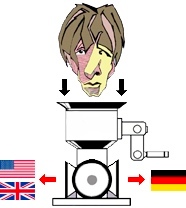| Pages in topic: < [1 2 3] > | Where is our business going to? Thread poster: Robert Rietvelt
|
|---|
| They still have the same power | Nov 18, 2019 |
Maxi Schwarz wrote:
These parts:
Jocelin Meunier wrote:
....One has cut rates by 60% all of a sudden .....
The pressure should be on clients to give better rates, ....
Clients are not employers, and they cannot dictate fees. You're the professional, and they are asking you for your services. Therefore you set the fee. A customer cannot "cut rates" because the rates are not determined by the customer. Since we set out fees, the only pressure is that some clients may not like our fees and thus not use our services. The wrong relationship is being established or assumed, too often, when I read discussions on forums.
Clients are not employers, but they still dictate what you make. Like you said, some clients may not like our fees and thus not use our services. That is how they dictate fees: if you don't accept, they tell you goodbye and wait for the next translator in line, until one accepts the rate they propose.
We do decide who to work for, but then again this takes me back to my original point: every choice is starting to be the same. Clients (be it direct or agencies) are focused on one rate and refuse anyone trying to negotiate. And yes, some agencies can decide to cut rates, unfortunately. This is not the only relationship, but it certainly is the most prevalent.
| | | | | answering (Jocelin) | Nov 18, 2019 |
Jocelin Meunier wrote:
Clients are not employers, but they still dictate what you make. Like you said, some clients may not like our fees and thus not use our services. That is how they dictate fees: if you don't accept, they tell you goodbye and wait for the next translator in line, until one accepts the rate they propose.
Let's start with "if you (translator) don't accept" and "rate they propose". My clients ask me what me fee is for a translation. There is nothing for me to accept or refuse. I'm the one quoting my fee. My clients don't propose anything. Our interactions always start the same:
- Here is the document. Can you translate it?
- What is your fee and turnaround time?
The only thing for me to accept/refuse is the project itself. If it is not in my area of expertise or I'm too busy I might refuse. For the latter, we can sometimes postpone the project until I complete my other work.
Clients (be it direct or agencies) are focused on one rate and refuse anyone trying to negotiate.
If I am the one quoting my fee, then I cannot "try to negotiate" the fee that I quoted. That is, sometimes a client tries to negotiate my fee. That often ends the conversation - I'm a professional, not someone with a stand at a flee market selling dubious wares.
My clients are focused on quality and reliability. The agencies want to maintain that reputation, and the end clients have a purpose and a bad translation would defeat that purpose.
And yes, some agencies can decide to cut rates, unfortunately.
If I am the one quoting my fee, then the customer (agency) cannot "cut" the fee which is mine to quote. Many that I hear of are under the mistaken assumption that they are employers and have the role of an employer. One should not go for that.
This is not the only relationship, but it certainly is the most prevalent.
It seems the most prevalent one cited in forums. Might it have to do with the large companies (the ones we read about being successful in all the money they make) and/or platform-related? What if nobody went for it? What if everyone quoted his or her fee, making it clear that that is how you hire a professional for professional work?
| | | | Dan Lucas 
United Kingdom
Local time: 05:11
Member (2014)
Japanese to English
| Change your market | Nov 18, 2019 |
Jocelin Meunier wrote:
Clients (be it direct or agencies) are focused on one rate and refuse anyone trying to negotiate. And yes, some agencies can decide to cut rates, unfortunately. This is not the only relationship, but it certainly is the most prevalent.
I accept that it is possible that such a model is the most prevalent, but that's because it represents the mass market, where cost is more important than quality. You don't want to be working at the undifferentiated, low-value-added end of the market. MT is steadily eating into that already.
You have to offer something more than a competitive price, because that boots you upward into a whole different market. Compare this to the recent comment by a translator specialising in medical who noted that since she got a qualification in nursing she attracts a very different, and better, class of client. There's a lesson in that.
Regards,
Dan
| | | | Robert Rietvelt 
Local time: 06:11
Member (2006)
Spanish to Dutch
+ ...
TOPIC STARTER | Our business is going down the drain | Nov 21, 2019 |
Sorry for reviving this thread, but I had an interesting, or better said 'alarming', conversation with a PM today.
They offered me a job for €0.06 p/w, I offered to go down to €0.09 p/w. Answer: 'Sorry, no can do, the client is offering a low rate'. THE CLIENT???? I thought it was the agency who sets the price.
So this is it, it is the client who decides the price (and in the end the future of our sector).
Sounds familiar?
[Edited at 2019-11-22 ... See more Sorry for reviving this thread, but I had an interesting, or better said 'alarming', conversation with a PM today.
They offered me a job for €0.06 p/w, I offered to go down to €0.09 p/w. Answer: 'Sorry, no can do, the client is offering a low rate'. THE CLIENT???? I thought it was the agency who sets the price.
So this is it, it is the client who decides the price (and in the end the future of our sector).
Sounds familiar?
[Edited at 2019-11-22 11:58 GMT] ▲ Collapse
| | |
|
|
|
Michael Newton 
United States
Local time: 00:11
Japanese to English
+ ...
| Where is our business going to? | Nov 22, 2019 |
To the dogs.
| | | | Peter Leeflang 
United States
Local time: 00:11
Member (2014)
French to English
+ ...
Today's poor client may be tomorrow's client that can afford you. Nothing is static in any business line.
| | | | | No matter how low a rate the client "offers" ... | Nov 22, 2019 |
Robert Rietvelt wrote:
Sorry for reviving this thread, but I had an interesting, or better said 'alarming', conversation with a PM today.
They offered me a job for €0.06 p/w, I offered to go down to €0.09 p/w. Answer: 'Sorry, no can do, the client is offering a low rate'. THE CLIENT???? I thought it was the agency who sets the price.
So this is it, it is the client who decides the price (and in the end the future of our sector).
Sounds familiar?
[Edited at 2019-11-22 11:58 GMT]
... the ONLY party who will be affected is the translator. The agency will still be taking the same chunk out of what the client "offers" and do so by passing on the lower rate to the translator. If we ALL start to say no, then things will change. But nowadays too many people are willing to lower their rates in order to land jobs. Just look at the Proz job offers for starters.
| | | | | Out of curiosity | Nov 22, 2019 |
Peter Leeflang wrote:
Today's poor client may be tomorrow's client that can afford you. Nothing is static in any business line.
Purely out of curiosity, have you ever seen this happen in translation? An agency that used to pay low rates starts paying better?
| | |
|
|
|
Tom in London
United Kingdom
Local time: 05:11
Member (2008)
Italian to English
| YOU set you rate | Nov 22, 2019 |
Too many translators allow the agency to set the rate. Which is madness.
You, the translator, should set your rate. If someone says they can't pay it, politely refuse to work for them.
If you're a good and professional translator, there will be a demand for your work.
[Edited at 2019-11-22 16:42 GMT]
| | | | | When I buy a jacket... | Nov 22, 2019 |
I don’t know; say you can buy a jacket and pay 25 euro. Yes, you will get drenched and cold when the weather is bad, but it will still be called a jacket. I, considering myself a reasonable person, do not buy such jackets. I pay at least 99 euro (without paying for “cool” brands either) and make sure all the basic technical features are there and the garment looks decent to say the very least. I could also buy a special jacket if I planned to hike out to the nature and stay there for a cou... See more I don’t know; say you can buy a jacket and pay 25 euro. Yes, you will get drenched and cold when the weather is bad, but it will still be called a jacket. I, considering myself a reasonable person, do not buy such jackets. I pay at least 99 euro (without paying for “cool” brands either) and make sure all the basic technical features are there and the garment looks decent to say the very least. I could also buy a special jacket if I planned to hike out to the nature and stay there for a couple of days (which unfortunately I don’t do). Then I would have to pay in excess of 400 euros for a good jacket. The price (and the quality that accompanies it) serves the purpose.
0.01 euro translator = 25 euro jacket (a person who speaks both languages and has never worked as a full-time translator).
0.06 euro translator = 99 euro jacket (a professional translator who does not have a solid client base nor a clear specialization).
0.10+ euro translator = 400+ euro jacket (a lawyer, a doctor, a chemist, a biologist, an aeronautical engineer, etc. who years ago, for whatever reason, decided to change their career and dedicate themselves to translation activity; they have a good client base, recurring customers, are well-respected within their domain and are able to maintain a healthy business relationship with their existing and potential customers alike).
Go and pick your jacket... and the agencies/clients certainly do.
[Edited at 2019-11-22 19:38 GMT] ▲ Collapse
| | | | | On rates by clients | Nov 22, 2019 |
This is something I noticed more and more, recently. A couple of agencies told me that rates depend on the client and how much they are willing to pay. This tendency seems to be spreading. It would explain why it is near impossible to find agencies that accept decent rates. Because if they don't cave in to the client, they can always say "You're not the only agency out here, I will ask someone else".
I don't think you can educate businessmen. If they can pressure the industry into constant... See more This is something I noticed more and more, recently. A couple of agencies told me that rates depend on the client and how much they are willing to pay. This tendency seems to be spreading. It would explain why it is near impossible to find agencies that accept decent rates. Because if they don't cave in to the client, they can always say "You're not the only agency out here, I will ask someone else".
I don't think you can educate businessmen. If they can pressure the industry into constantly lowering the rates, they most certainly will. ▲ Collapse
| | | | DZiW (X)
Ukraine
English to Russian
+ ...
| Beggars are NO choosers | Nov 22, 2019 |
As far as I also believe there should be no "pure" translators, but (1) specialists in a real field with (2) business awareness and (3) foreign language skills, I do welcome such a Parasite Eve when overwhelming number of middlemen and spongers proudly dictate their rules and terms to the under-penny needy: Either come stronger and smarter, or don't bother thinking big at all! Hearing that another wannabe businessman cannot even tell 'gain', 'income', and 'profit', I find the modern term "freelancer" as a mere euphemism for "hobbyist", "ignoramus", or "unemployed/rejected":
How could an established (after two-three-five-ten years) independent* businessperson earn less than a McDonald's freshman? Absurd!
| | |
|
|
|
| An important contribution here | Nov 23, 2019 |
Attila Piróth has an important point here:
https://www.proz.com/forum/business_issues/338707-translators_without_borders_and_the_platform_economy.html
It IS, as he warns, a long read, but it is well worth the effort IMHO.
It explains some of the mechanisms behind 'commoditization' of translation.
... See more Attila Piróth has an important point here:
https://www.proz.com/forum/business_issues/338707-translators_without_borders_and_the_platform_economy.html
It IS, as he warns, a long read, but it is well worth the effort IMHO.
It explains some of the mechanisms behind 'commoditization' of translation.
I have been complaining for years that translation should not be sold by the kilo like groceries, and even then, those who sell groceries can charge higher rates for quality products.
In fact the eternal focus on price per word is the big mistake. Machine translation can process thousands of words in an instant, so why do we want to jack up prices?
Instead, we should be looking at the work involved. Every translation is in fact more or less tailored to a unique context. MT builds on human input, which was not produced in an instant. No one looks at the hours of work involved to get there.
We should go beyond simply saying no to ridiculous offers.
We should tell clients:
'You know what, that job you are offering me would take me X hours. The absolute minimum wage in my country is XX per hour, plus expenses and taxes because I am self-employed. (Here, add a suitable amount, which is quite a lot here in Scandinavia, for expenses, pension, insurance, holiday pay etc. plus subscriptions to a CAT tool and other software...)
So my realistic fee for the job would be XXX.'
You only have to work this out and formulate it once, then have it ready to insert in mails.
Just saying no is not going to succeed in the long run. There seems to be an endless queue of suckers who will work for rock bottom rates, and clients who accept the kinds of translation they produce.
If we all started sending that kind of mail, it just might make an impression.
Add on a line or two about quality and what you in particular can offer... This will not be so easy to standardize for all clients, but perhaps two or three basic versions will do when you know you will never get the job anyway.
Write to newspapers and politicians, get translators´ professional associations to take action...
They are the nearest we have to the trade unions that stood up for industrial workers in the last two centuries.
We are preaching to the converted here, and it is fine to coordinate our efforts, but somehow we have to get the message over to agencies and clients.
We have to stand together and take action, if we want to have a say in where the business is going. And THANK you for calling it a business, not an industry! ▲ Collapse
| | | | Abba Storgen (X)
United States
Local time: 23:11
Greek to English
+ ...
| I warned, didn't I... | Jan 21, 2020 |
I had noted these problems back from 2004 (in these very forums). At any rate, translators are doing a Job, not a Career (a career has promotions, benefits etc and you are building a resume... while a job is just that - labor only). The rate decrease reflects not only the negotiating power of the middlemen (agencies), but also that a huge part of your labor has become obsolete. Because of automation. The pace of jobs and the rate combined, indicate an international sweatshop for those relying on... See more I had noted these problems back from 2004 (in these very forums). At any rate, translators are doing a Job, not a Career (a career has promotions, benefits etc and you are building a resume... while a job is just that - labor only). The rate decrease reflects not only the negotiating power of the middlemen (agencies), but also that a huge part of your labor has become obsolete. Because of automation. The pace of jobs and the rate combined, indicate an international sweatshop for those relying on the income (not for those using it as a side income). So, plan accordingly. Personally, I stayed too long, didn't follow my own advice, due to continuous personal obligations. Good luck to all. ▲ Collapse
| | | | Yolande Hivart
Austria
Local time: 06:11
Member (2016)
German to French
| Advice from the chamber of commerce | Jan 21, 2020 |
Recently I had a workshop with the chamber of commerce where they explained us why we should not compete on rates. Rates may be a part of the decision choice but between two quoters who offer their rate with the usual margin, this is not always the cheapest that get the best offer but the one that offers the best feeling. Of course agencies do not offer this, they do not offer A translator at this rate, they offer a translation for X rate and only once they got the offer they start charging the ... See more Recently I had a workshop with the chamber of commerce where they explained us why we should not compete on rates. Rates may be a part of the decision choice but between two quoters who offer their rate with the usual margin, this is not always the cheapest that get the best offer but the one that offers the best feeling. Of course agencies do not offer this, they do not offer A translator at this rate, they offer a translation for X rate and only once they got the offer they start charging the translator. They might even use the CV of translator A to get the bid and internally decide after few weeks to give the job to a cheaper translator B hoping that the TM will be able to force the translator B to write like the translator A. The end client will never see the CV of translator B and keep internally blaming translator A for the decreasing quality of the job he is not even doing anymore.
This cannot happen (or should not) when a client is establishing a direct relationship with a translator. The translator should be honest enough, if the translation goes out of his hands to review it himself.
I have some clients that told me "do not bother about the rate and the deadline, just ensure that it is done by this very translator". This is where the clients could have some leverage on the agency when they see that after few weeks the quality is going downhills, this may too be because a cheaper provider had been replaced under the same umbrella to save the margin.
Considering that I myself - when working without middlemen - should not undercut myself, i decided to put the rates that seemed normal in 2004 on my website in 2020. I know, in between came the market crash from which we never recovered and i know that since then the 2004 had been cut by 40 % by even up to then loyal end client that decided to play bidder once against the other for survival. But just before the turn of another crash, if you were not here before the crash of 2008, I will tell you one thing: the rate may be one thing, but the pre-2008 0.04 cent bidders of that time did not survived the last time competition went on price.
Agencies may tell you the contrary to keep their margins, but with economics turmoils ahead, you'd better have your saving vest tight on you and do not expect this time to survive on prices alone, last time there was a margin to compete, this time you will not survive on cheaper rates if you want to keep paying your electricity bills.
I am sure the ones who will survive the next wave, at least in what we call the developped world (where the developping world tries to replace us offering TM-assisted B2 level foreign texts) will not be on rates but how we manage to establish a contact and trust with the clients in our own country showing them there is a difference when they give us the chance to establish a win-win relationship. ▲ Collapse
| | | | | Pages in topic: < [1 2 3] > | To report site rules violations or get help, contact a site moderator: You can also contact site staff by submitting a support request » Where is our business going to? | CafeTran Espresso | You've never met a CAT tool this clever!
Translate faster & easier, using a sophisticated CAT tool built by a translator / developer.
Accept jobs from clients who use Trados, MemoQ, Wordfast & major CAT tools.
Download and start using CafeTran Espresso -- for free
Buy now! » |
| | Protemos translation business management system | Create your account in minutes, and start working! 3-month trial for agencies, and free for freelancers!
The system lets you keep client/vendor database, with contacts and rates, manage projects and assign jobs to vendors, issue invoices, track payments, store and manage project files, generate business reports on turnover profit per client/manager etc.
More info » |
|
| | | | X Sign in to your ProZ.com account... | | | | | |













































